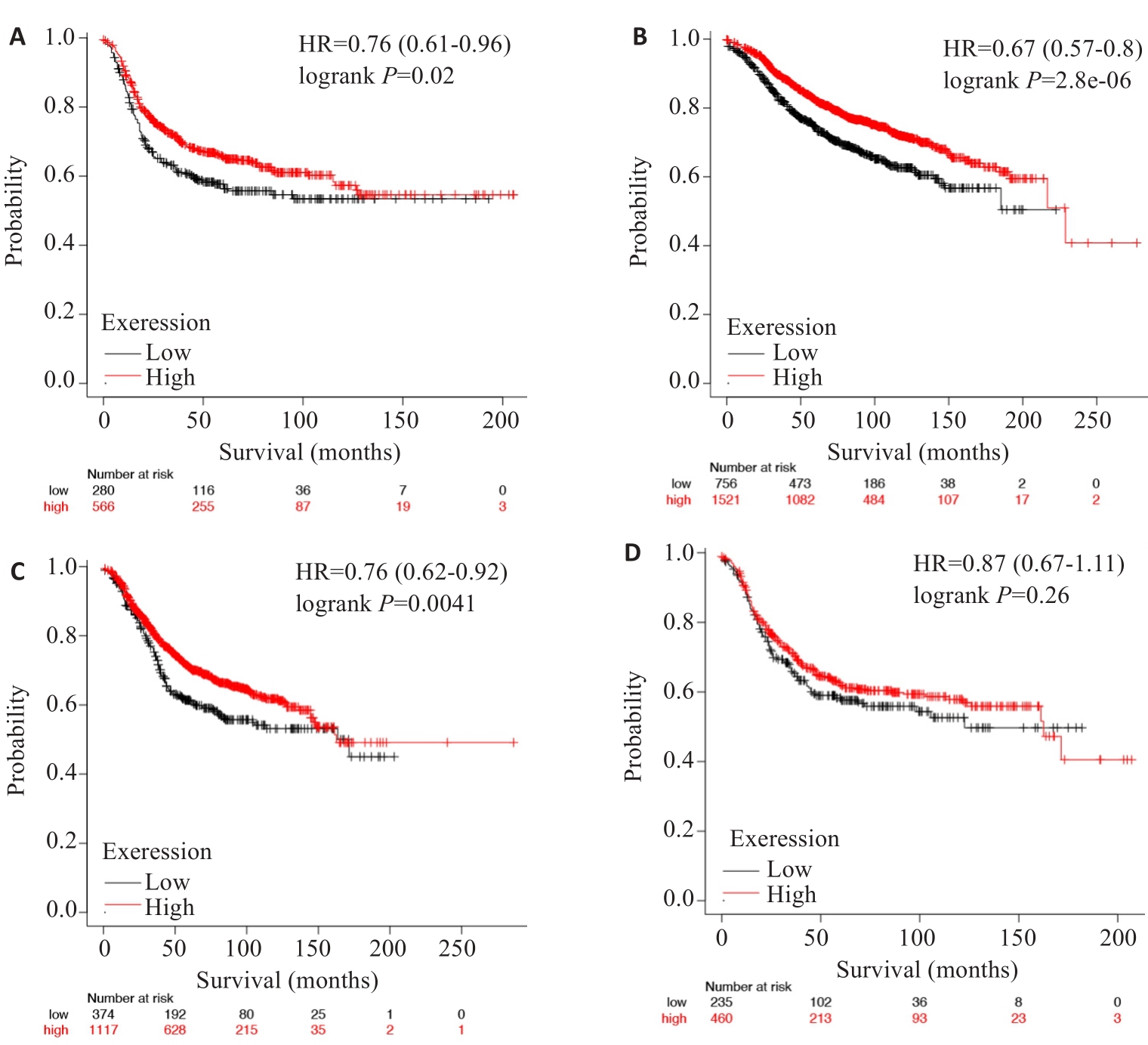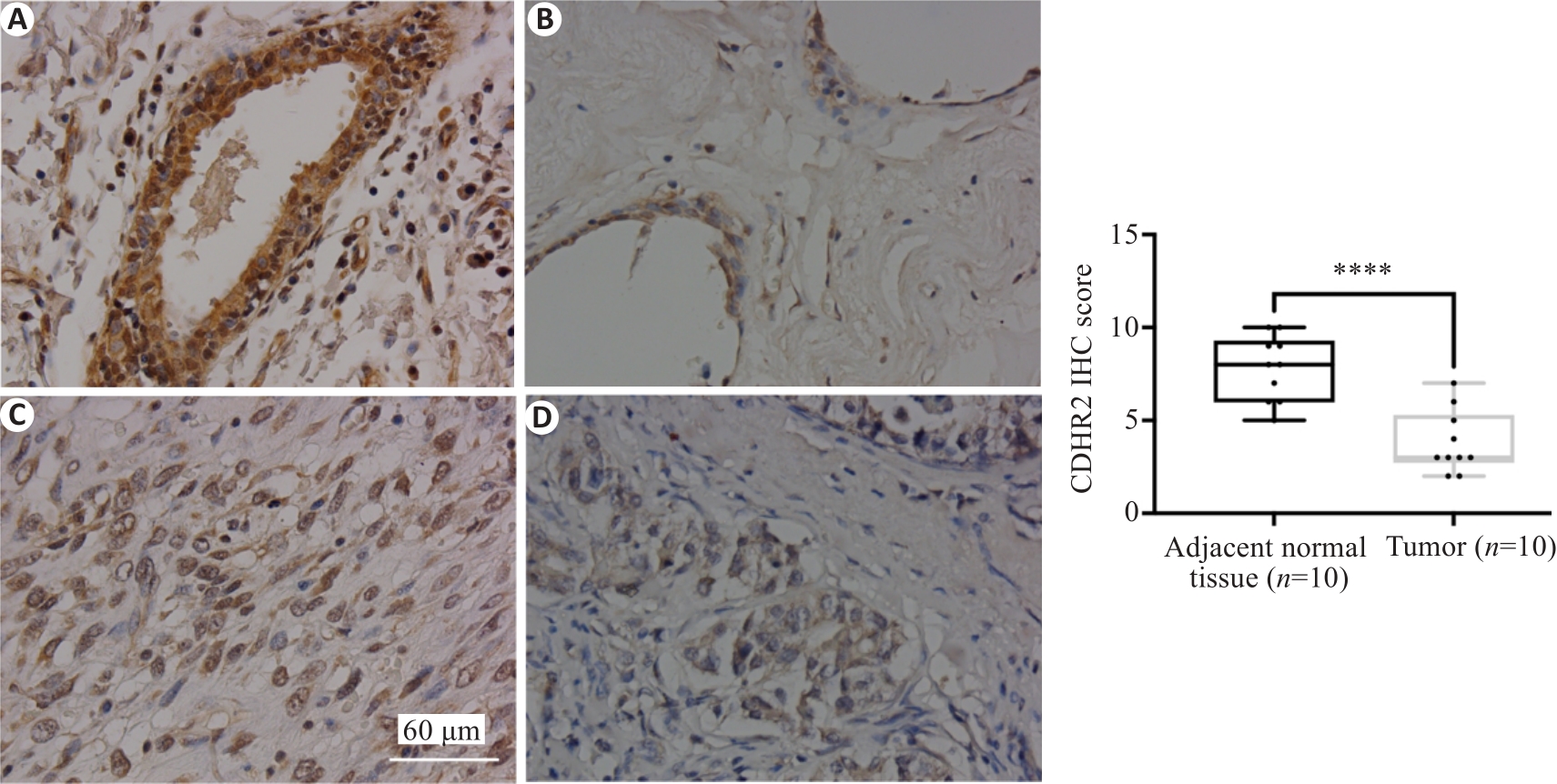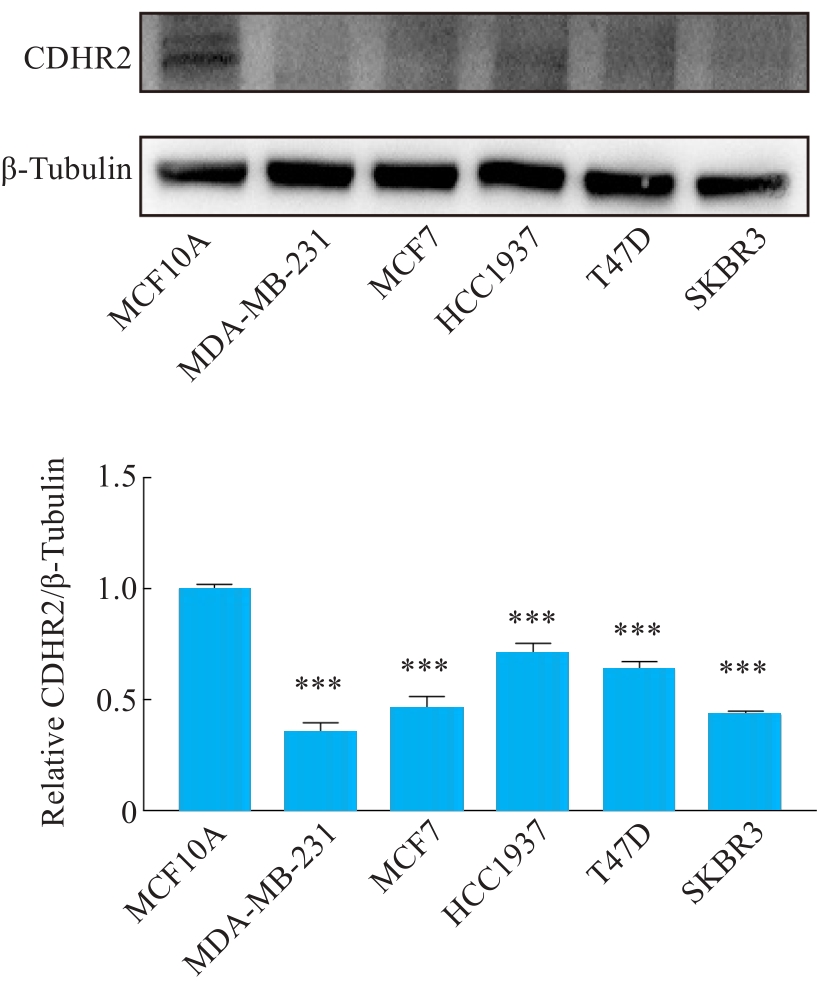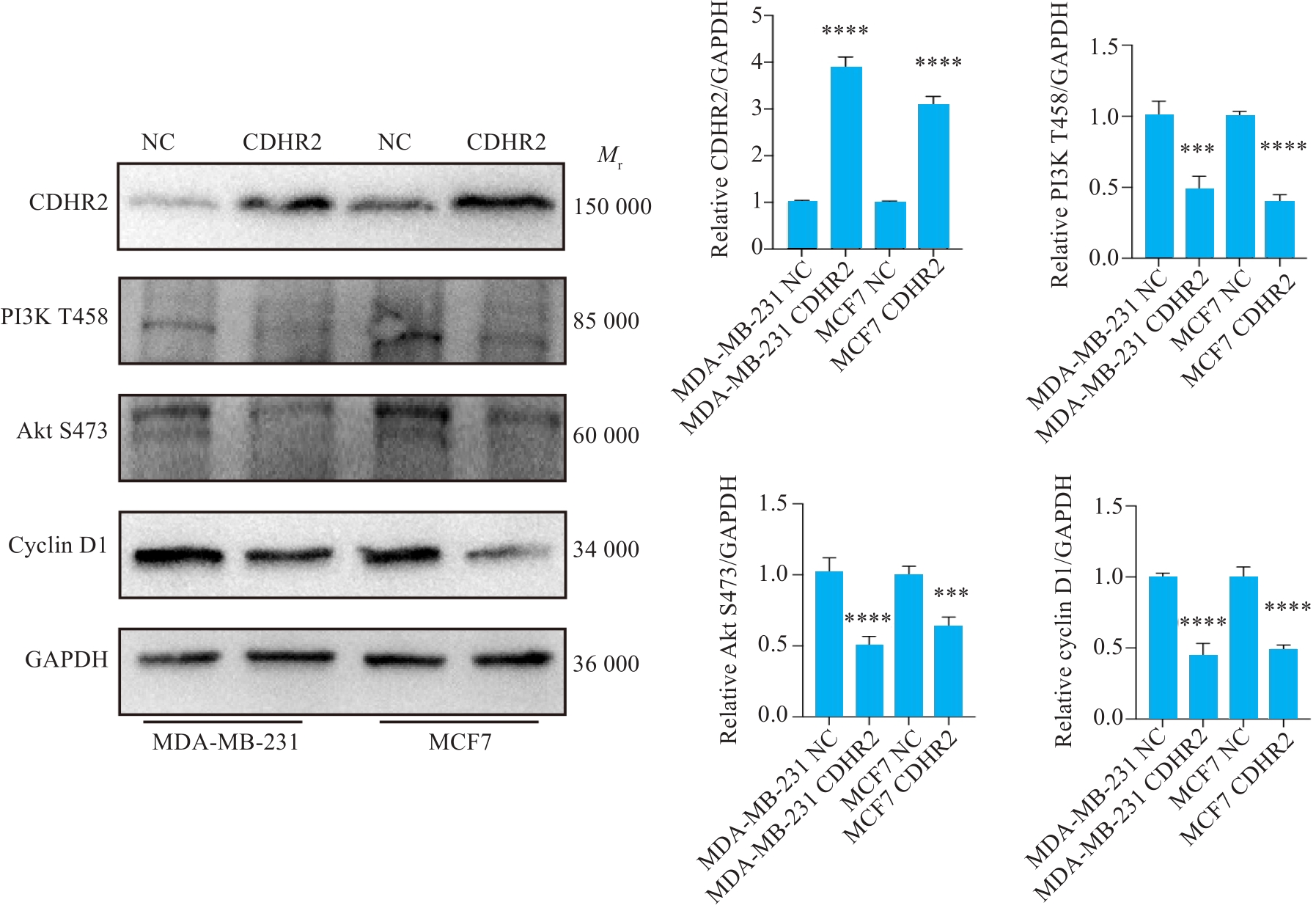Journal of Southern Medical University ›› 2024, Vol. 44 ›› Issue (6): 1117-1125.doi: 10.12122/j.issn.1673-4254.2024.06.12
Jincun FANG1,2,3( ), Liwei LIU2, Junhao LIN1(
), Liwei LIU2, Junhao LIN1( ), Fengsheng CHEN1,3(
), Fengsheng CHEN1,3( )
)
Received:2023-11-09
Online:2024-06-20
Published:2024-07-01
Contact:
Junhao LIN, Fengsheng CHEN
E-mail:fangjincun@126.com;l_i_n@163.com;fsc0126@163.com
Supported by:Jincun FANG, Liwei LIU, Junhao LIN, Fengsheng CHEN. Overexpression of CDHR2 inhibits proliferation of breast cancer cells by inhibiting the PI3K/Akt pathway[J]. Journal of Southern Medical University, 2024, 44(6): 1117-1125.
Add to citation manager EndNote|Ris|BibTeX
URL: https://www.j-smu.com/EN/10.12122/j.issn.1673-4254.2024.06.12

Fig.2 Survival outcomes of breast cancer patients with low and high CDHR2 expressions. A-D: Relationship between CDHR2 expression and prognosis of the patients with triple-negative (A), luminal A (B), luminal B (C), and Her2-overexpressing (D) breast cancer, respectively.

Fig.3 Fig. 3 Immunohistochemical staining for CDHR2 in clinical specimens of breast cancer tissues (Original magnification: ×400). A: Strong expression of CDHR2 in breast tissues. B: Weak expression of CDHR2 in breast tissues. C: Strong expression of CDHR2 in breast cancer tissues. D: Weak expression of CDHR2 in breast cancer tissues. ****P<0.0001.

Fig.5 CDHR2 protein expression levels in breast cancer cell lines and normal human mammary epithelial cells detected by Western blotting. ***P<0.001 vs MCF10A.

Fig.10 Western blotting of PI3K/Akt signaling pathway proteins and cyclin D1 in the transfected cells. ***P<0.001, ****P<0.0001 vs negetive control (NC).
| 1 | Siegel RL, Miller KD, Wagle NS, et al. Cancer statistics, 2023[J]. CA Cancer J Clin, 2023, 73(1): 17-48. |
| 2 | Kawiak A. Molecular research and treatment of breast cancer[J]. Int J Mol Sci, 2022, 23(17): 9617. |
| 3 | An JS, Peng C, Tang HL, et al. New advances in the research of resistance to neoadjuvant chemotherapy in breast cancer[J]. Int J Mol Sci, 2021, 22(17): 9644. |
| 4 | Barzaman K, Karami J, Zarei Z, et al. Breast cancer: biology, biomarkers, and treatments[J]. Int Immunopharmacol, 2020, 84: 106535. |
| 5 | Pancho A, Aerts T, Mitsogiannis MD, et al. Protocadherins at the crossroad of signaling pathways[J]. Front Mol Neurosci, 2020, 13: 117. |
| 6 | Yu JS, Koujak S, Nagase S, et al. PCDH8, the human homolog of PAPC, is a candidate tumor suppressor of breast cancer[J]. Oncogene, 2008, 27(34): 4657-65. |
| 7 | Harada H, Miyamoto K, Yamashita Y, et al. Prognostic signature of protocadherin 10 methylation in curatively resected pathological stage I non-small-cell lung cancer[J]. Cancer Med, 2015, 4(10): 1536-46. |
| 8 | Haruki S, Imoto I, Kozaki KI, et al. Frequent silencing of protocadherin 17, a candidate tumour suppressor for esophageal squamous cell carcinoma[J]. Carcinogenesis, 2010, 31(6): 1027-36. |
| 9 | Fang S, Huang SF, Cao J, et al. Silencing of PCDH10 in hepatocellular carcinoma via de novo DNA methylation independent of HBV infection or HBX expression[J]. Clin Exp Med, 2013, 13(2): 127-34. |
| 10 | Lei SY, Zheng RS, Zhang SW, et al. Global patterns of breast cancer incidence and mortality: a population-based cancer registry data analysis from 2000 to 2020[J]. Cancer Commun, 2021, 41(11): 1183-94. |
| 11 | Chodosh LA. Breast cancer: current state and future promise[J]. Breast Cancer Res, 2011, 13(6): 113. |
| 12 | McDonald ES, Clark AS, Tchou J, et al. Clinical diagnosis and management of breast cancer[J]. J Nucl Med, 2016, 57(): 9S-16S. |
| 13 | Griguolo G, Pascual T, Dieci MV, et al. Interaction of host immunity with HER2-targeted treatment and tumor heterogeneity in HER2-positive breast cancer[J]. J Immunother Cancer, 2019, 7(1): 90. |
| 14 | Vega-Benedetti AF, Loi E, Moi L, et al. Clustered protocadherins methylation alterations in cancer[J]. Clin Epigenetics, 2019, 11(1): 100. |
| 15 | Imoto I, Izumi H, Yokoi S, et al. Frequent silencing of the candidate tumor suppressor PCDH20 by epigenetic mechanism in non-small-cell lung cancers[J]. Cancer Res, 2006, 66(9): 4617-26. |
| 16 | Wang CL, Yu GZ, Liu JC, et al. Downregulation of PCDH9 predicts prognosis for patients with glioma[J]. J Clin Neurosci, 2012, 19(4): 541-5. |
| 17 | Zhen YL, Pavez M, Li XY. The role of Pcdh10 in neurological disease and cancer[J]. J Cancer Res Clin Oncol, 2023, 149(10): 8153-64. |
| 18 | Xia ZY, Huang MJ, Zhu QQ, et al. Cadherin related family member 2 acts As A tumor suppressor by inactivating AKT in human hepatocellular carcinoma[J]. J Cancer, 2019, 10(4): 864-73. |
| 19 | Okazaki N, Takahashi N, Kojima SI, et al. Protocadherin LKC, a new candidate for a tumor suppressor of colon and liver cancers, its association with contact inhibition of cell proliferation[J]. Carcinogenesis, 2002, 23(7): 1139-48. |
| 20 | Ose R, Yanagawa T, Ikeda S, et al. PCDH24-induced contact inhibition involves downregulation of beta-catenin signaling[J]. Mol Oncol, 2009, 3(1): 54-66. |
| 21 | Luo J, Yao JF, Deng XF, et al. 14, 15-EET induces breast cancer cell EMT and cisplatin resistance by up-regulating integrin αvβ3 and activating FAK/PI3K/AKT signaling[J]. J Exp Clin Cancer Res, 2018, 37(1): 23. |
| 22 | Spangle JM, Dreijerink KM, Groner AC, et al. PI3K/AKT signaling regulates H3K4 methylation in breast cancer[J]. Cell Rep, 2016, 15(12): 2692-704. |
| 23 | Xu JC, Chen TY, Liao LT, et al. NETO2 promotes esophageal cancer progression by inducing proliferation and metastasis via PI3K/AKT and ERK pathway[J]. Int J Biol Sci, 2021, 17(1): 259-70. |
| 24 | Wang Q, He GP, Hou MM, et al. Cell cycle regulation by alternative polyadenylation of CCND1[J]. Sci Rep, 2018, 8(1): 6824. |
| 25 | Hermosilla VE, Salgado G, Riffo E, et al. SALL2 represses cyclins D1 and E1 expression and restrains G1/S cell cycle transition and cancer-related phenotypes[J]. Mol Oncol, 2018, 12(7): 1026-46. |
| 26 | Feng YF, Qian WW, Zhang Y, et al. CDCA2 promotes the proliferation of colorectal cancer cells by activating the AKT/CCND1 pathway in vitro and in vivo [J]. BMC Cancer, 2019, 19(1): 576. |
| 27 | Xie ZZ, Li W, Ai JG, et al. C2orf40 inhibits metastasis and regulates chemo-resistance and radio-resistance of nasopharyngeal carcinoma cells by influencing cell cycle and activating the PI3K/AKT/mTOR signaling pathway[J]. J Transl Med, 2022, 20(1): 264. |
| 28 | Zhong Y, Yang LT, Xiong F, et al. Long non-coding RNA AFAP1-AS1 accelerates lung cancer cells migration and invasion by interacting with SNIP1 to upregulate c-Myc[J]. Signal Transduct Target Ther, 2021, 6(1): 240. |
| 29 | Kar G, Gursoy A, Keskin O. Human cancer protein-protein interaction network: a structural perspective[J]. PLoS Comput Biol, 2009, 5(12): e1000601. |
| 30 | Cho HJ, Hwang YS, Yoon J, et al. EphrinB1 promotes cancer cell migration and invasion through the interaction with RhoGDI1[J]. Oncogene, 2018, 37(7): 861-72. |
| [1] | Zhi CUI, Cuijiao MA, Qianru WANG, Jinhao CHEN, Ziyang YAN, Jianlin YANG, Yafeng LÜ, Chunyu CAO. A recombinant adeno-associated virus expressing secretory TGF‑β type II receptor inhibits triple-negative murine breast cancer 4T1 cell proliferation and lung metastasis in mice [J]. Journal of Southern Medical University, 2024, 44(5): 818-826. |
| [2] | Yan WANG, Yuqing RUAN, Can CUI, Xiu WANG. Jiaotaiwan improves brain glucose metabolism in a mouse model of Alzheimer's disease by activating the PI3K/AKT signaling pathway [J]. Journal of Southern Medical University, 2024, 44(5): 894-903. |
| [3] | Yongsheng XIA, Lian WANG, Xiaohua CHEN, Yulu ZHANG, Aofei SUN, Deli CHEN. TSR2 overexpression inhibits proliferation and invasion of gastric cancer cells by downregulating the PI3K/AKT signaling pathway [J]. Journal of Southern Medical University, 2024, 44(5): 913-919. |
| [4] | HUANG Qiuhu, ZHOU Jian, WANG Zizhen, YANG Kun, CHEN Zhenggang. MiR-26-3p regulates proliferation, migration, invasion and apoptosis of glioma cells by targeting CREB1 [J]. Journal of Southern Medical University, 2024, 44(3): 578-584. |
| [5] | ZHU Jin, OUYANG Xin, LIU Yu, QIAN Yemei, XIA Bin, SHI Yanan, YU Lifu. MiR-132-3p negatively regulates CAMTA1 to promote Schwann cell proliferation and migration and alleviates I-125 seeds-induced exacerbation of facial nerve injury in rats [J]. Journal of Southern Medical University, 2024, 44(3): 571-577. |
| [6] | SHEN Mengdi, ZHAO Na, DENG Xiaojing, DENG Min. High expression of COX6B2 in gastric cancer is associated with poor long-term prognosis and promotes cell proliferation and cell cycle progression by inhibiting p53 signaling [J]. Journal of Southern Medical University, 2024, 44(2): 289-297. |
| [7] | ZHANG Nuo, ZHANG Zhen, ZHANG Yulu, SONG Xue, ZHANG Xiaofeng, LI Jing, ZUO Lugen, HU Jianguo. PCID2 is highly expressed in gastric cancer and affects the prognosis by regulating cancer cell cycle and proliferation [J]. Journal of Southern Medical University, 2024, 44(2): 324-332. |
| [8] | LIU Xuerou, YANG Yumei, CAI Hui, ZHANG Yaoshuai, FAN Fangtian, LI Xian, LI Shanshan. Aumolertinib inhibits proliferation, invasion and migration and promotes apoptosis of neuroblastoma cells by downregulating MMP2 and MMP9 expression [J]. Journal of Southern Medical University, 2023, 43(9): 1493-1499. |
| [9] | WANG Lian, XIA Yongsheng, ZHANG Zhen, LIU Xinyue, SHI Jinran, WANG Yueyue, LI Jing, ZHNAG Xiaofeng, GENG Zhijun, SONG Xue, ZUO Lugen. High expression of MRPL13 promotes cell cycle progression and proliferation of gastric cancer cells by inhibiting p53 signaling to affect long-term prognosis [J]. Journal of Southern Medical University, 2023, 43(9): 1558-1566. |
| [10] | XU Mengqi, SHI Yutong, LIU Junping, WU Minmin, ZHANG Fengmei, HE Zhiqiang, TANG Min. JAG1 affects monocytes-macrophages to reshape the pre-metastatic niche of triple-negative breast cancer through LncRNA MALAT1 in exosomes [J]. Journal of Southern Medical University, 2023, 43(9): 1525-1535. |
| [11] | XU Jiaming, LIN Long, CHEN Qionghui, LI Lan. Hsa-miR-148a-3p promotes malignant behavior of breast cancer cells by downregulating DUSP1 [J]. Journal of Southern Medical University, 2023, 43(9): 1515-1524. |
| [12] | YU Zhengtao, LI Jiameng, JIANG Junwen, LI You, LIN Long, XIA Ying, WANG Lei. miRNA-128-3p inhibits malignant behavior of glioma cells by downregulating KLHDC8A expression [J]. Journal of Southern Medical University, 2023, 43(9): 1447-1459. |
| [13] | ZHANG Xiaolin, WU Haosong, WANG Sheng. SLC12A8 promotes proliferation, invasiveness, migration and epithelial-mesenchymal transition of bladder cancer cells by activating JAK/STAT singaling [J]. Journal of Southern Medical University, 2023, 43(9): 1613-1621. |
| [14] | LAN Yu, WANG Kaifeng, LAN Zhixian, ZHOU Heqi, SUN Jian. Dealcoholized red wine inhibits occurrence and progression of hepatocellular carcinoma possibly by inducing cell cycle arrest and apoptosis [J]. Journal of Southern Medical University, 2023, 43(8): 1297-1305. |
| [15] | SHEN Liuqing, ZHANG Dingyu, GAO Shegan. Effect of Porphyromonas gingivalis infection on IFNGR1 palmitoylation in esophageal cancer cells [J]. Journal of Southern Medical University, 2023, 43(7): 1155-1163. |
| Viewed | ||||||
|
Full text |
|
|||||
|
Abstract |
|
|||||